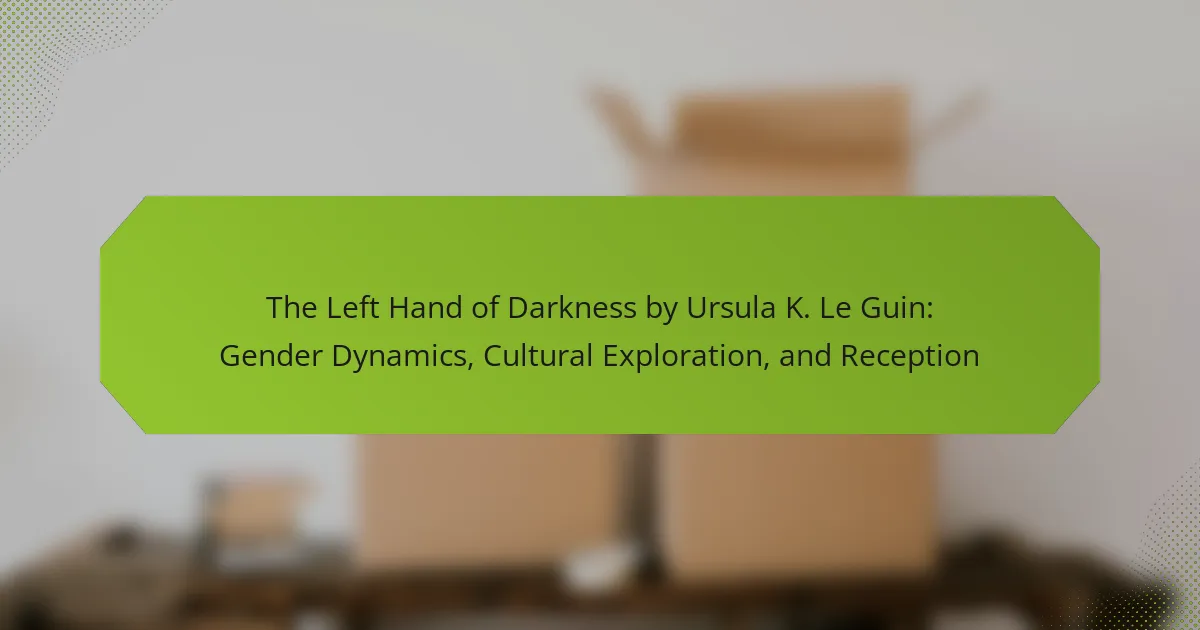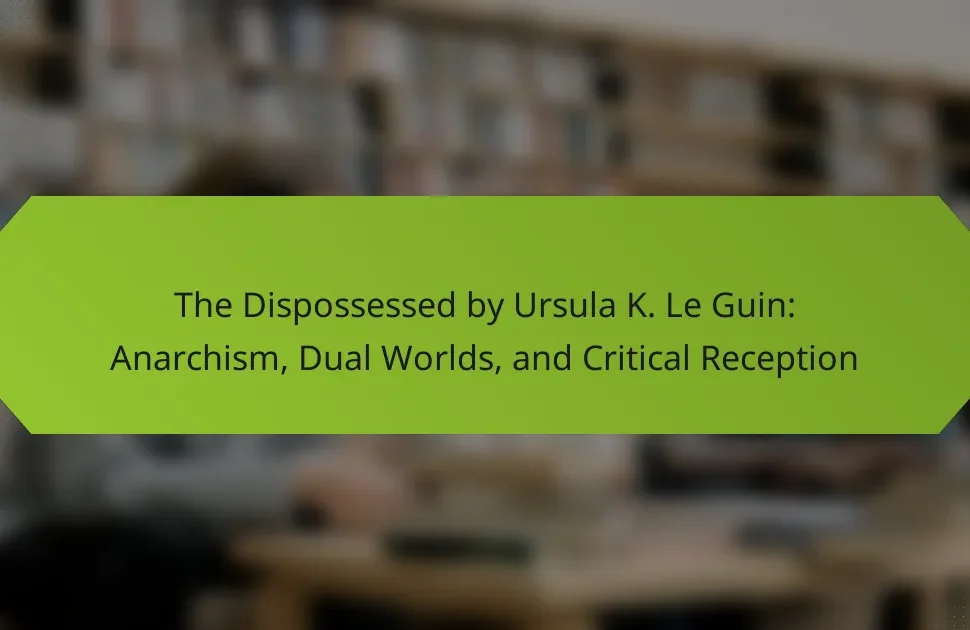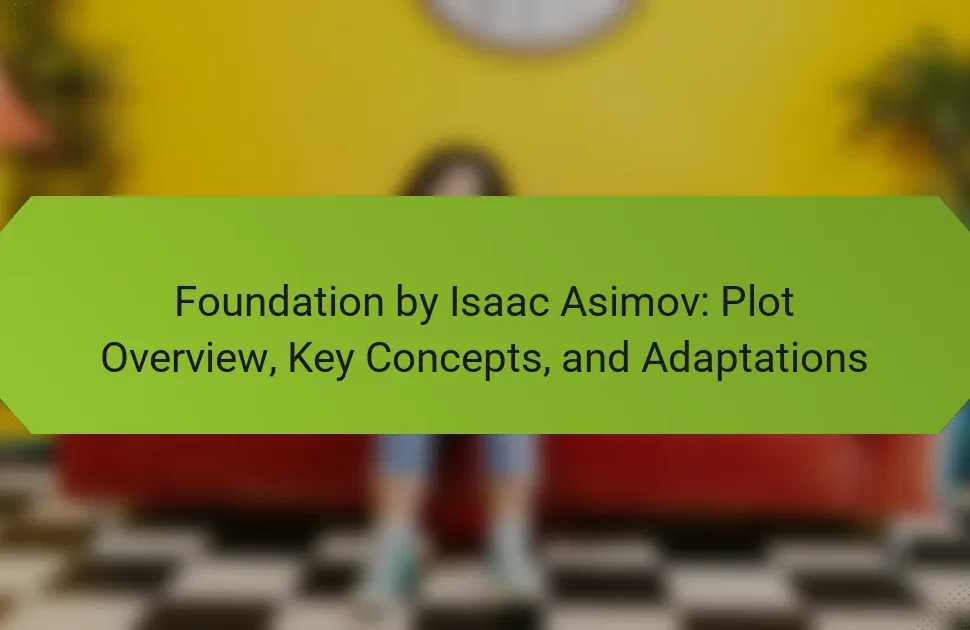“The Left Hand of Darkness” by Ursula K. Le Guin challenges conventional gender norms and explores fluidity in identity. The novel examines cultural dynamics, political structures, and the impact of societal norms on personal relationships. It has garnered critical acclaim for its innovative narrative and lasting influence on feminist literature. The reception of the work highlights its relevance in contemporary discussions around gender and cultural understanding.
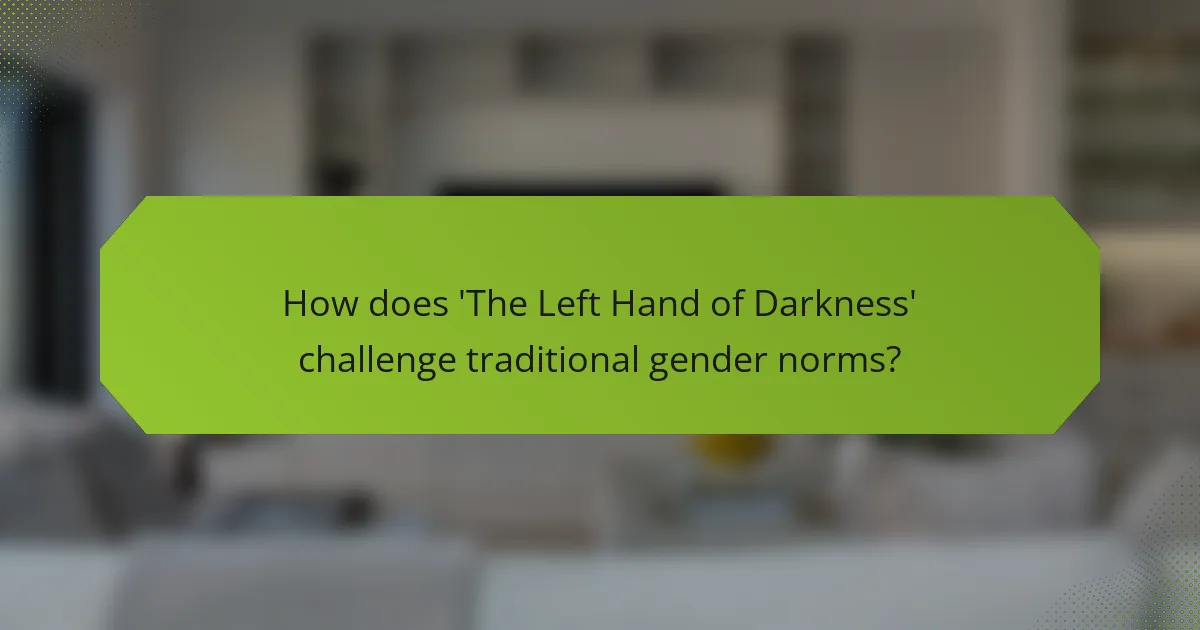
How does ‘The Left Hand of Darkness’ challenge traditional gender norms?
“The Left Hand of Darkness” challenges traditional gender norms by presenting a society where gender is fluid and not fixed. This narrative explores the complexities of identity, emphasizing that gender is a social construct rather than a biological determinant. The inhabitants of Gethen, known as ambisexuals, embody both male and female characteristics, which disrupts conventional gender roles. This unique attribute allows for deeper cultural exploration of relationships and power dynamics, ultimately inviting readers to reconsider their own perceptions of gender. Le Guin’s work has received critical acclaim for its innovative approach, making it a significant contribution to feminist literature.
What are the key gender dynamics presented in the novel?
The key gender dynamics in “The Left Hand of Darkness” explore the fluidity of gender and its cultural implications. The novel presents a society where inhabitants are ambisexual, challenging traditional gender roles. This unique attribute allows for a deeper examination of masculinity and femininity, revealing how these constructs shape social interactions and power dynamics. The narrative emphasizes that gender is not a fixed identity but a spectrum influenced by cultural context. As a result, readers gain insight into the complexities of gender identity and its impact on human relationships.
How do the characters embody fluidity in gender identity?
The characters in “The Left Hand of Darkness” embody fluidity in gender identity through their androgynous nature and cultural practices. The inhabitants of Gethen possess a unique biological trait, being ambisexual, which allows them to adopt either male or female roles during their mating cycle. This fluidity challenges traditional gender norms and highlights the social constructs surrounding gender identity. Le Guin uses this setting to explore themes of identity and connection, emphasizing that gender is not a fixed attribute but a dynamic aspect of human experience. The characters’ experiences reflect the complexities of identity, illustrating how societal expectations shape personal understanding of gender.
What cultural implications arise from the portrayal of gender?
The portrayal of gender in “The Left Hand of Darkness” challenges traditional norms and fosters cultural reflection. Le Guin’s depiction of androgynous beings encourages readers to reconsider societal constructs of masculinity and femininity. This narrative promotes empathy and understanding across gender identities, revealing how cultural implications shape perceptions of gender roles. The unique attribute of the novel lies in its exploration of a society where gender is fluid, prompting discussions on the impact of these dynamics on relationships and power structures.

Which cultural explorations are central to the narrative?
Cultural explorations in “The Left Hand of Darkness” focus on gender, politics, and social structures. Le Guin examines the androgynous inhabitants of Gethen, challenging traditional gender roles. The narrative explores themes of friendship, loyalty, and the impact of cultural differences on identity and relationships. This exploration invites readers to reconsider their own societal norms and assumptions about gender and culture.
How does the setting influence the story’s themes?
The setting in “The Left Hand of Darkness” profoundly influences its themes of gender dynamics and cultural exploration. The planet Gethen, with its harsh climate and unique societal structures, challenges traditional notions of gender.
The portrayal of ambisexuality among Gethenians allows Le Guin to explore themes of identity and the fluidity of gender roles. This setting encourages readers to question their own cultural norms and perceptions of gender. Additionally, the political landscape of Gethen reflects themes of cooperation and rivalry, emphasizing the importance of understanding different cultures.
The reception of the novel highlights its groundbreaking approach to these themes, demonstrating how the setting shapes the narrative’s impact on readers. The interplay between environment and societal constructs ultimately deepens the exploration of human relationships and understanding.
What role does politics play in the cultural landscape of the novel?
Politics significantly shapes the cultural landscape in “The Left Hand of Darkness” by influencing gender dynamics and societal norms. The novel explores a world where traditional gender roles are subverted, allowing for a nuanced examination of identity and culture. Political structures in the narrative reflect the complexities of human relationships and the impact of governance on social cohesion. As a result, Le Guin critiques real-world political systems, highlighting how power dynamics affect cultural perceptions of gender. The interplay between politics and culture deepens the reader’s understanding of both the fictional society and our own.
How are societal structures depicted in the world of Gethen?
Societal structures in Gethen are depicted as fluid and non-binary, challenging traditional gender norms. The unique attribute of ambisexuality in Gethenian culture influences social roles and relationships. This fluidity fosters a society where gender does not dictate power dynamics or social hierarchy. As a result, political and personal interactions are based on mutual respect and collaboration rather than rigid gender expectations.
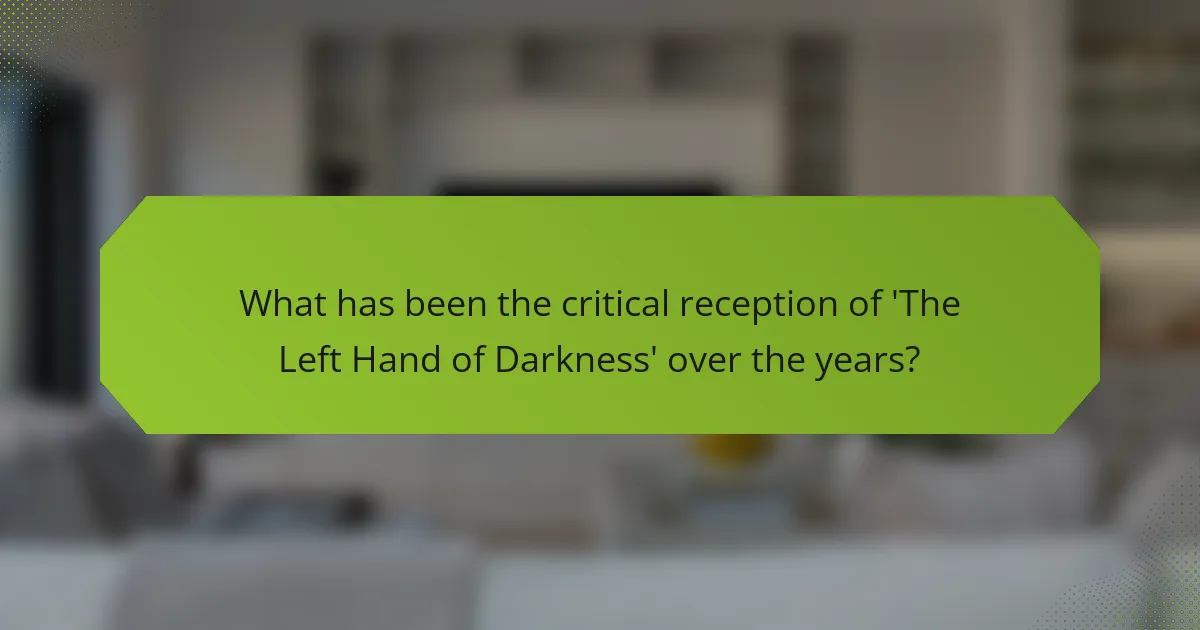
What has been the critical reception of ‘The Left Hand of Darkness’ over the years?
“The Left Hand of Darkness” has received critical acclaim for its exploration of gender dynamics and cultural themes. Over the years, it has been praised for its innovative narrative structure and thought-provoking content. The book won the Hugo and Nebula awards, solidifying its status as a seminal work in science fiction. Critics often highlight its impact on the genre, noting how it challenges traditional gender roles and promotes empathy through diverse perspectives. The novel continues to be relevant, influencing discussions around gender and society in contemporary literature.
Which themes have resonated with readers and critics alike?
Themes of gender dynamics and cultural exploration in “The Left Hand of Darkness” have resonated with both readers and critics. The novel’s unique portrayal of androgyny challenges traditional gender norms, prompting discussions on identity. Critics praise Le Guin’s exploration of cultural relativism, highlighting its relevance to contemporary societal issues. The book’s reception reflects its impact on science fiction, establishing it as a cornerstone for feminist literature.
How has the novel influenced science fiction and feminist literature?
The novel has significantly influenced science fiction and feminist literature by challenging traditional gender roles and exploring cultural dynamics. “The Left Hand of Darkness” presents a unique perspective on gender fluidity, encouraging readers to reconsider societal norms. This groundbreaking work has inspired numerous authors to delve into themes of identity and social constructs. Its reception has sparked critical discussions on the intersection of gender and culture, shaping the trajectory of feminist narratives in the genre.
What controversies or debates have emerged regarding its themes?
Debates surrounding “The Left Hand of Darkness” focus on its portrayal of gender and cultural relativism. Critics argue that the ambisexuality of its characters challenges traditional gender norms, while others contend it simplifies gender issues. The book’s reception has sparked discussions about cultural appropriation and the representation of non-Western societies. Le Guin’s exploration of gender fluidity remains a pivotal point in feminist literary criticism, highlighting both its innovative qualities and the controversies it evokes within gender discourse.
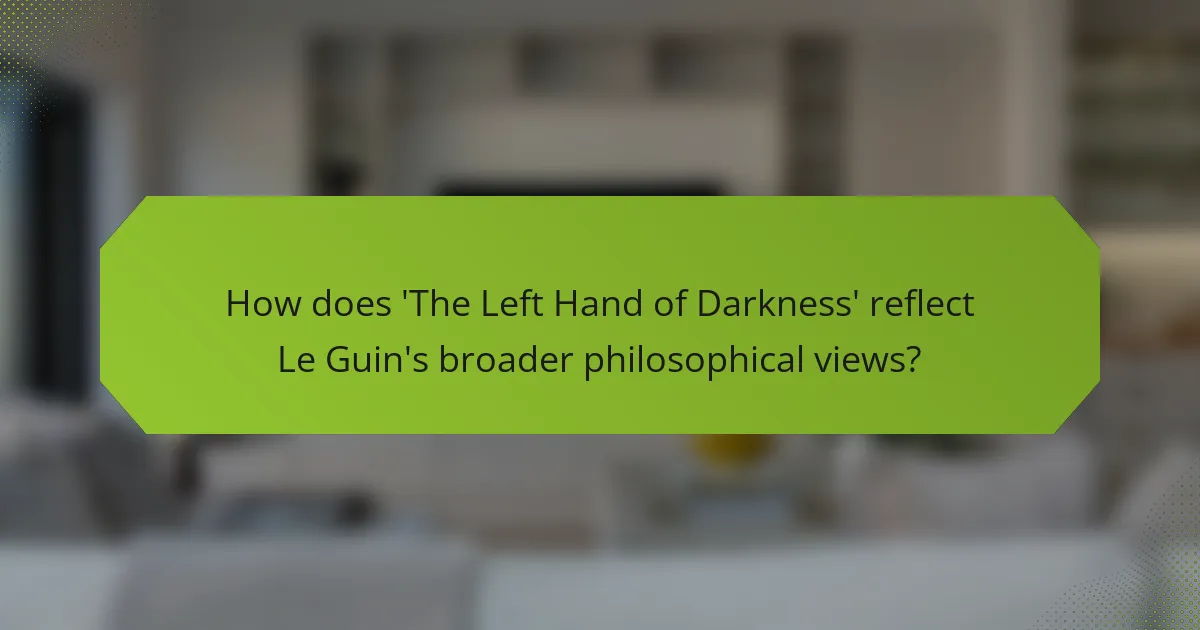
How does ‘The Left Hand of Darkness’ reflect Le Guin’s broader philosophical views?
“The Left Hand of Darkness” reflects Le Guin’s broader philosophical views by challenging traditional gender norms and promoting cultural relativism. The novel presents a society where gender is fluid, encouraging readers to reconsider their perceptions of identity. Le Guin’s exploration of empathy and understanding across cultures emphasizes the importance of connection and communication. This aligns with her belief in the transformative power of literature to foster social change. The reception of the novel highlights its impact on feminist discourse and science fiction, showcasing its enduring relevance in discussions of gender and culture.
What are the underlying messages about humanity and society?
“The Left Hand of Darkness” conveys profound messages about humanity and society, particularly through its exploration of gender dynamics and cultural relativism. The novel challenges traditional gender roles by presenting a society where individuals can change gender, prompting readers to reconsider fixed notions of identity. This fluidity highlights the social constructs surrounding gender and emphasizes empathy and understanding across cultural divides. Additionally, the narrative critiques the binary view of gender, suggesting that humanity’s richness lies in its diversity. Le Guin’s work ultimately encourages readers to reflect on their own societal norms and the importance of embracing difference.
How does Le Guin’s personal background inform her writing?
Le Guin’s personal background deeply influences her writing, particularly in “The Left Hand of Darkness.” Her experiences in diverse cultures and her anthropological insights shape her exploration of gender dynamics and cultural themes. Growing up in a family of academics, she developed a strong appreciation for literature and social sciences. This background informs her unique perspective on gender fluidity, allowing her to challenge traditional binaries. Additionally, her travels and interactions with various cultures enhance the authenticity of her world-building and character development.
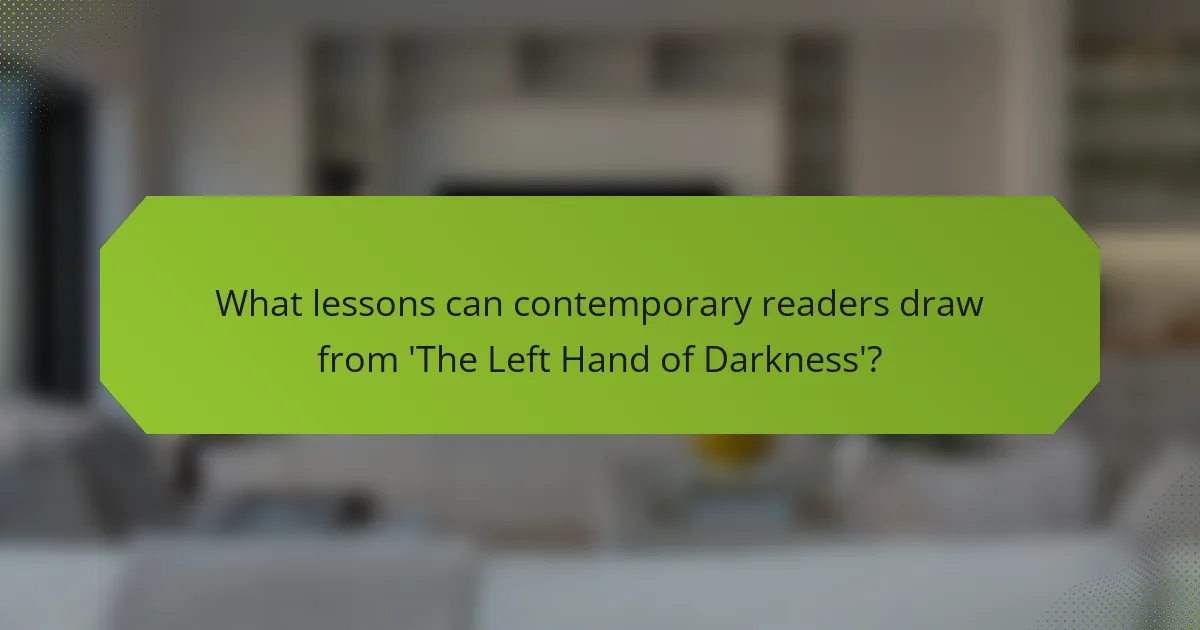
What lessons can contemporary readers draw from ‘The Left Hand of Darkness’?
Contemporary readers can draw significant lessons from “The Left Hand of Darkness” about the fluidity of gender and the importance of cultural understanding. The novel challenges traditional gender roles by presenting a society where individuals are ambisexual, prompting readers to reconsider their own perceptions of gender. This exploration encourages empathy and open-mindedness towards diverse cultures and identities. Additionally, the book highlights the impact of societal norms on personal relationships, emphasizing the need for communication and connection across differences. Ultimately, it serves as a reminder of the complexities within human identity and the value of embracing diversity.
What are the best practices for discussing gender and culture in literature?
To discuss gender and culture in literature effectively, focus on inclusive perspectives and contextual understanding. Analyze character development, narrative structure, and cultural settings to reveal gender dynamics.
Utilize diverse critical lenses, such as feminist theory and postcolonial analysis, to deepen discussions. Encourage open dialogue about interpretations and consider varied cultural backgrounds of readers.
Engage with the text’s reception history to understand its impact on societal views of gender and culture. Highlight unique attributes of characters and settings that challenge traditional norms.
Promote interdisciplinary approaches by integrating insights from sociology, anthropology, and psychology to enrich literary analysis. This fosters a comprehensive understanding of the intricate relationships between gender and culture.
How can the novel’s themes be applied to modern societal issues?
The themes of “The Left Hand of Darkness” can be applied to modern societal issues by highlighting the fluidity of gender and the importance of cultural understanding. Gender dynamics in the novel challenge binary perceptions, reflecting contemporary discussions about gender identity. Cultural exploration emphasizes empathy and respect, crucial in today’s globalized society. The novel’s reception illustrates how literature can influence social perspectives, encouraging dialogue on diversity and inclusion.
What common mistakes should readers avoid when interpreting the text?
Readers should avoid overgeneralizing the gender dynamics presented in “The Left Hand of Darkness.” Misinterpretation can arise from viewing the text solely through a binary lens. Additionally, neglecting the cultural context of the planet Gethen diminishes the depth of Le Guin’s exploration. Readers often overlook the significance of the narrative’s structure, which intertwines gender and society, leading to simplistic conclusions. Lastly, failing to consider the historical reception of the book may skew understanding of its impact and relevance.
